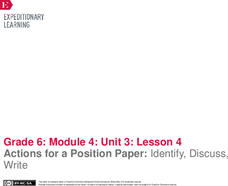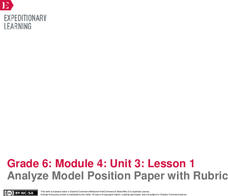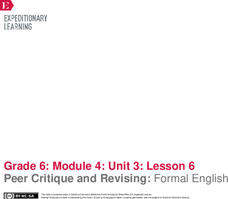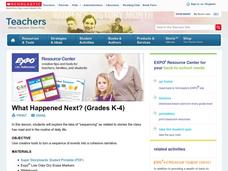Curated OER
Descriptive Writing: Using Art to Inspire description
Write with the senses! Try using art to inspire writers to consider all of the senses. Here, the class is divided in half. Each group looks at one of two images, imagines the senses that would be engaged, and records answers to five...
Virginia Department of Education
The Writing Process for Persuasive Writing
Get your junior high writers stimulated with the strategies and ideas available in this activity. Learners discuss and debate controversial subjects, and outline their reasons with an online graphic organizer (link included) that creates...
EngageNY
Peer Critique and Revision: Storyboard, Sections 1-4
Teamwork makes the dream work. Pupils participate in a peer critique process, using forms to offer constructive advice about each other's storyboards. Next, scholars revise their storyboards based on the feedback, and then share their...
Dream of a Nation
Writing an Analytic Essay
After researching an issue introduced in Tyson Miller's Dream of a Nation: Inspiring Ideas for a Better America, writers develop an original thesis statement and craft an analytic essay using evidence collected in their research.
EngageNY
Introducing Research Folders and Generating a Research Question
Take the next step in the writing process with a lesson plan geared towards the completion of writing an evidence-based essay about a rule to live by, as Bud did in Bud, Not Buddy by Christopher Paul Curtis. Pupils collaborate with their...
EngageNY
Revising: Strong Conclusions for My Accessing Books Around the World Informative Paragraph
It's important that writers leave their readers with a strong and satisfying conclusion. Help your young writers develop the skills to compose a concluding sentence with the steps outlined here. After class members have had a chance to...
EngageNY
Paragraph Writing: The Role of Religion in Colonial America
Informative writing is emphasized in the standards. Help your learners reach that goal with the plan for paragraph writing outlined here. After reviewing the work from the day before and adding to their vocabulary notebooks, class...
Museum of Tolerance
Family Role Model Activity
What does is take to be a role model? Through grand conversation, and the use of books and a graphic organizer, scholars find out and apply the requirements to identify a role model within their family. They then journey through the...
EngageNY
Actions for a Position Paper: Identify, Discuss, Write
Anchors aweigh, it's time to write! After viewing an anchor chart detailing the parts of a position paper, pupils share their plans for their essays with a partner. Next, they write the rough draft of their body paragraphs.
EngageNY
Analyze Model Position Paper with Rubric
It's time to choose a position! Scholars read a model position paper about fracking to practice identifying the topic and argument. Then, working with a partner, they use a rubric to assess the essay.
Little Stones
How Can Poetry Make People Think and Care?
Can beautiful words change the world? Literary scholars discover how to paint their visions of change using poetry in a series of three workshops. Each independent topic gives participants a chance to examine their feelings about...
Overcoming Obstacles
Writing Reports and Presenting to an Audience
A two-part lesson introduces learners to a six-step process for writing and presenting oral reports. Participants learn how to select, limit, and research a topic, how to organize their notes, draft and revise their reports, and practice...
K20 LEARN
Let Us Start The Lettuce Club (Or Not): Writing A Thesis Statement
Let us be frank! Writers learn that crafting a thesis statement is not that difficult if one peals back the layers. After watching several videos about the elements of a thesis, class members read the article "Lettuce Club helps students...
EngageNY
Peer Critique and Revising: Formal English
Dear Sir or Madam: What's the difference between formal and informal language? Scholars focus on using formal English and transitions in their position papers. After revising their rough drafts, they engage in the peer editing process...
Scholastic
What Happened Next? (Grades K-4)
Explore the structure of narrative writing with this fun, collaborative lesson. Start by reading aloud a short story, asking small groups of learners to fill in key events on a large story board prepared on the class whiteboard....
EngageNY
Storyboard Revision: Managing the Sequence of Events and Using Sensory Details
Mastering techniques from the resource, pupils give life to their writing, revising their storyboards to include sensory details and transitions. To finish, they participate in a peer critique process and use the feedback to further...
Curated OER
Lesson Plan: Letting Go
Why would an artist destroy his own work? Kids examine the Malagan practice of creating and then destroying art. They talk about the cultural and spiritual significance of this practice, as well as how it relates to consumerism in...
The Kennedy Center
Fairy Tale Variations
Here are two great lessons that work together and are inspired by the Stephen Sondheim musical Into the Woods. Young writers and actors will retell the story of "The Frog Prince" through games, improvisational script writing, and song....
Curated OER
Bringing Household Items to Life
Use folk tales as inspiration for learning about and using personification in creative writing. Learners brainstorm together in order to practice personification before writing their own poems or paragraphs about a household object.
EngageNY
Grade 9 ELA Module 1, Unit 1, Lesson 17
Eighth graders demonstrate their understanding with the final assessment in a literary analysis unit based on Karen Russell's short story, "St. Lucy's Home for Girls Raised by Wolves." Having prepared for the assessment in the last few...
Curated OER
Making Magical Creatures Talk
Invite your young writers to take the reins with writing dialogue. Using two characters of their own creation, kids work with partners and then individually to write short conversations.
Kenan Fellows
Assembly Required and the Design Process Too!
An engineering design lesson plan contains connected activities as a capstone engineering project. The activities revolve around the principle of improving an existing object and designing the manufacturing process in order to do so. The...
National Council of Teachers of English
Writing Acrostic Poems with Thematically Related Texts in the Content Areas
Scholars scour thematically aligned texts to gather a bank of words they can use in an original acrostic poem.
K20 LEARN
What Do You Want To Talk About? Writing Dialogue
Pictures really do talk in a lesson that teaches young writers how to craft dialogues. Class members closely examine Grant Wood's American Gothic, imagine what the couple might think or feel, and put these words to paper, crafting a...
Other popular searches
- Guided Writing Process
- Descriptive Writing Process
- Teaching the Writing Process
- The Writing Process
- 5 Step Writing Process
- Writing Process Drafting
- Writing Process Lesson Plans
- Writing Process Steps
- Steps of Writing Process
- Four Steps of Writing Process
- Six Trait Writing Process
- Essay Writing Process

























